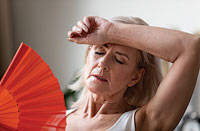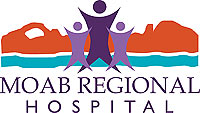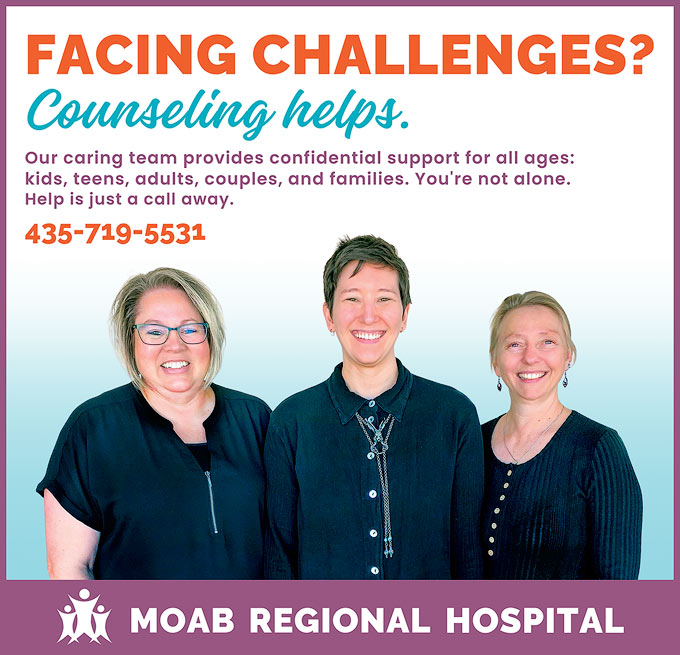HEALTHY HAPPENINGS - April 2024
|
What You Don’t Know About Estrogen Can Hurt You
by Ray Andrew, MD
|
|
Suzy couldn’t wait for menopause: No more painful periods, no more going through a box of feminine products every month, no more “Everyone tiptoe around Mom this week”, and no more need for birth control.

Little did she know what she was in for. When menopause arrived, Suzy discovered she traded one set of problems for another: hot flashes, night sweats, vaginal dryness (“Don’t even think about intimacy, buster!”), and PMS 24/7/365. Tired of changing her pajamas three times a night, she finally saw her doctor. There, she learned that doctors used to prescribe estrogen for these problems, but the practice had been discontinued due to unacceptable health risks. Instead, she was prescribed an antidepressant and told to try black cohosh. When these yielded only minimal relief of her symptoms, Suzy returned to her doctor looking for any help she could get.
“I’m so sorry, Suzy, but the standard of care prioritizes your life over your hot flashes. On the bright side, menopausal symptoms usually go away within six months to five years. Only a minority of women have them the rest of their lives, so odds are good this stage won’t last forever.”
The “standard of care” to which most physicians subscribe is based on the landmark Women’s Health Initiative (WHI) trial, which was terminated in 2002. Investigators ended it earlier than planned when they discovered that estrogen caused breast cancer, heart attack, stroke, and blood clots. The news sent shockwaves through the conventional medical community, leading experts to call for an end to hormone replacement. As was Suzy’s experience, this advice caused women throughout the world untold pain and suffering. 
Meanwhile, specialists in functional medicine spent countless hours reassuring our patients that the headlines did not apply to them. Why? Because the WHI investigators drew sweeping conclusions about hormones without even studying hormones.
Hormones are made in the human body and have a lock-and-key relationship with receptors on other cells in the body. Technology has enabled us to replicate the identical structures of those hormone messengers in the laboratory so people who no longer make enough of a given hormone on their own can still benefit from its action in hormone replacement form. Insulin and thyroid hormones are well-known life-saving examples of this.
Instead of studying human hormones, the WHI studied two drugs. The first was a mixture of estrogens extracted from pregnant mares’ urine, euphemistically called conjugated equine estrogens. In theory, this would be fine, as horses make estrogens too. The problem is that humans and horses don’t make the same estrogens. As a result, the “fit” between horse estrogens and human estrogen receptors is a rough one. Ditto for the fit between the other drug—medroxyprogesterone acetate—and human progesterone receptors. The body can tell the difference, and the difference over time can lead to disease and dysfunction.
The bright side of the WHI is that it convinced millions of women to stop taking dangerous chemicals masquerading as hormone replacement. Unfortunately, some experts, unfamiliar with decades of research on human hormones, unwittingly cast a much broader net and decried bioidentical hormones as well—throwing out the baby with the bath water, so to speak.
Fortunately, research from the early 1900s to now demonstrates that human estrogens have numerous beneficial effects. This should surprise no one since both men and women make estrogen in varying amounts throughout our lives.
In particular, very recent studies confirm that estradiol supplementation in middle age enhances working memory, processing speed, and executive function, which are dependent on the volume of the hippocampus in the brain. In other words, less estradiol means smaller hippocampus, which means decreased brain function. Estradiol also reduces brain inflammation and oxidative stress while increasing the function of nerves that otherwise tend to deteriorate in dementia. In fact, a study released in 2021 found that women who underwent menopausal hormone therapy for six or more years were 79% less likely to develop Alzheimer’s.
Additionally, a recent NIH study of 7 million women found that estradiol (as long as it isn’t taken by mouth) reduces:
· Overall death by 20% (amounting to 77,401 fewer deaths than expected in the study group)
· 5 types of cancer: breast, lung, uterine, colon, and ovarian
· All neurodegenerative diseases (Alzheimer’s, Parkinson’s, and all other dementias)
· Heart attack, heart failure, blood clots, stroke, and atrial fibrillation
Finally, a large study conducted in Cache County, Utah, demonstrated that the earlier a woman starts hormone replacement and the longer she takes it, the better her brain function will be in late life.
In other words, everything doctors and the public alike were taught about hormone replacement with estrogen was wrong!
Since 2002, our national medical societies have told us: to use the lowest possible dose of estrogen (if any at all) for the shortest possible amount of time; to only use government-approved oral forms of estrogens; to avoid estrogens in older patients; and to avoid estrogens in women with or at risk for breast cancer.
By contrast, the actual science demonstrates that estrogen:
· protects AGAINST cancer
· reduces inflammation
· protects against cognitive decline
· protects against stroke and heart attack
· prolongs life
· is more important the older a woman is
· is essential for protection against osteoporosis
But hormones don’t operate in isolation. The human body does not function optimally with a single hormone any more than a cello alone makes a symphony. The best results come from a carefully-balanced mix of testosterone, estradiol, and progesterone, all of which work together in every living cell in the body.
Moreover, the hormonal signals themselves are useless without functioning receptors on cells and fully-supplied machinery inside cells. Hormone receptors and intracellular machinery require zinc, magnesium, vitamin B6, iodine, vitamin A, boron, and vitamin C. This requires not only a healthy diet, but a healthy gut as well. Fortunately, we now have a number of tools for determining the health of your hormones, diet, and gut so you can make sure your body is tuned up perfectly, both for peak performance now and optimal health long into the future. If you are anything like Suzy and find that your hormone symphony sounds more like a third-grade band rehearsal, call Prestige Wellness Institute at (435) 210-0184.
And be sure to mention you read about Prestige Wellness in Moab Happenings.
|
Create a Nighttime Routine for Better Mental Health
by Hospital Staff
|

Good sleep is essential for mental well-being. It helps ease anxiety and depression and boosts resilience. Research shows that quality sleep even lowers the risk of developing mental health conditions. However, getting good sleep is more complicated than it sounds, especially when suffering from mental health symptoms. A nighttime routine is helpful for better sleep and mental health.
The Relationship Between Sleep and Mental Health
Your body has many jobs, like reminding you to eat and maintaining a healthy temperature. Your brain has internal clocks to ensure these things happen at the right time. One of these clocks is called the circadian rhythm. The circadian rhythm controls many things, including appetite and temperature. It also strongly affects mood, partly because it controls many hormones.
When the circadian rhythm is disrupted, it leads to many mental health challenges. These include depression, anxiety, and bipolar disorder. And what disrupts the circadian rhythm? Poor sleep. The link between the circadian rhythm, mood disorders, and sleep is one way that sleep affects mental health.
You also need sleep for cognitive function, which means, in short, your mental abilities. These include attention, memory, and emotions. When you are low on good sleep, it’s harder to navigate stress. You bounce back slower from challenges. You descend more quickly into panic and despair and find it difficult to function normally. These reactions aren’t about willpower. Without enough good sleep, your brain is less able to use mental skills or control mood.
Maintaining healthy sleep habits is vital for better mental health. But for most people, consistent sleep is easier said than done. A nighttime routine can help. Here are a few steps to build a healthy nighttime routine.
Start Your Routine at the Same Time Everyday
Pick a time about 30 minutes before when you usually head to bed. Make an inner commitment to this time. This is the official start time of your new nighttime routine. So, if you typically go to bed at 11 p.m., your new nighttime routine starts at 10:30 p.m.
If you want to start getting to bed earlier, start small. For example, move your routine 15 minutes earlier every few days. However, consistency is more important than big changes. Be realistic with yourself and make gradual shifts.
Charge Your Phone in a Different Room
You’ve heard it before, but it’s still true: looking at your smartphone before bed is terrible for sleep. The blue light from the screens affects sleep hormones and messes with your circadian rhythm. Social media apps also cause your brain to release the stress hormone cortisol, which has an especially harmful effect on mood right before bed and when waking up.
But it’s tough to put our phones down. Research shows that phones activate our brains similarly to addiction. Instead of fighting with yourself, remove the temptation and move your phone charger out of your bedroom. If you only implement one thing from this list, make it this. Reducing screen and social media use directly before sleep can make a life-changing difference.
Write in a Gratitude Journal
A gratitude practice is no substitute for mental health care, but it can be a valuable tool in a mental health toolkit. Science has proven that practicing gratitude increases resiliency and optimism, improves mood, and reduces stress.
So, consider buying a small journal to practice gratitude before bed. Take the time to write out one or two things that went well that day. For self-esteem, also write about one thing you did well that day. With time, these practices rewrite neural pathways and increase positive self-talk, which is especially beneficial before bedtime.
Do One Thing That Feels Good
This is the fun part of your routine. Choose a relaxing activity to do each night. You could read, listen to music, light a candle, or put on lotion. You could also cuddle a pet, create art, meditate, or go for a walk. Be creative and choose what you enjoy.
Beyond these steps, add whatever feels good to you. The beauty of nighttime routines is that they can be changed to fit your life. Be realistic and think about what you need. Then, commit to an intentional nighttime routine. You’ll sleep better than ever. And you’ll be taking an essential step in caring for your mental health.
Need more than a nighttime routine? Almost everyone can benefit from mental health counseling at some point in their lives.
Sometimes, just asking for help allows people to feel more hopeful and less alone, even after one session! No matter how big or small a problem feels, don’t hesitate to call Moab Regional Hospital at 435-719-5531. Our mental health providers offer support to people of all ages and backgrounds in a non-judgmental, confidential setting
|
|

Healthy Activities:
Apr 1 Tai Chi with Drew- 6pm, 76 south 100 West—in the back of Red Rock Bakery. Sign up online at
www.wellnesscollectivemoab.com
Apr 2 Mindful Momentum: A Group Health Coaching Journey with Laura- Embark on a transformative journey designed to empower and enlighten; this program focuses on alleviating the burdens of daily pressures while gaining clarity on your health priorities. Each week, we’ll delve into a unique theme, offering diverse perspectives to enhance your understanding of personal well-being. 5pm, 76 South 100 West—in the back of Red Rock Bakery. Sign up online at www.wellnesscollectivemoab.com
Apr 8 Dharma Recovery- Join Tom for Dharma Recovery, a peer-led movement and community that is unified by our trust in the potential of each of us to recover and find freedom from the suffering of addiction. We believe that the traditional Buddhist teachings, often referred to as the Dharma, offer a powerful approach to healing from addiction and living a life of true freedom. 6:30pm at Wellness Collective, 76 South 100 West—in the back of Red Rock Bakery.
www.wellnesscollectivemoab.com to save your spot.
Apr 9 Conscious Creations- Join a Wellness Collective facilitator to embrace your creative side through conscious creation. 5pm at Wellness Collective, 76 South 100 West—in the back of Red Rock Bakery.
www.wellnesscollectivemoab.com to save your spot.
Apr 11 Rolf Movement Class: "The Spine: Biomechanics and Unlocking Contralateral Movement." In this class we'll learn the basic anatomy and biomechanics of the spine and explore movement practices that help to release restrictions in the spine, unlocking the potential for contralateral movement. Join Katie for a workshop you won't want to miss. 6:30pm at Wellness Collective, 76 South 100 West—in the back of Red Rock Bakery. www.wellnesscollectivemoab.com to save your spot.
Apr 15 Tai Chi with Drew- 6pm, 76 south 100 West—in the back of Red Rock Bakery. Sign up online at
www.wellnesscollectivemoab.com
Apr 22 Dharma Recovery- Join Tom for Dharma Recovery, a peer-led movement and community that is unified by our trust in the potential of each of us to recover and find freedom from the suffering of addiction. We believe that the traditional Buddhist teachings, often referred to as the Dharma, offer a powerful approach to healing from addiction and living a life of true freedom. 6:30pm at Wellness Collective, 76 South 100 West—in the back of Red Rock Bakery.
www.wellnesscollectivemoab.com to save your spot.
Apr 16 Mindful Momentum: A Group Health Coaching Journey with Laura- Embark on a transformative journey designed to empower and enlighten; this program focuses on alleviating the burdens of daily pressures while gaining clarity on your health priorities. Each week, we’ll delve into a unique theme, offering diverse perspectives to enhance your understanding of personal well-being. 5pm, 76 South 100 West—in the back of Red Rock Bakery. Sign up online at
www.wellnesscollectivemoab.com
Apr 23 Conscious Creations- Join a Wellness Collective facilitator to embrace your creative side through conscious creation. 5pm at Wellness Collective, 76 South 100 West—in the back of Red Rock Bakery.
www.wellnesscollectivemoab.com to save your spot.
Apr 24 Yoga for First Responders- Join Breann with Wellness Collective for a special yoga class for first responders only. Class is free and you can sign up for class online at wwwwellnesscollectivemoab.com. 6:30pm, 76 South 100 West—in the back of Red Rock Bakery.
Apr 29 Tai Chi with Drew- 6pm, 76 south 100 West—in the back of Red Rock Bakery. Sign up online at
www.wellnesscollectivemoab.com
Apr 30 Mindful Momentum: A Group Health Coaching Journey with Laura- Embark on a transformative journey with Laura's Mindful Momentum Group Health Coaching sessions. Designed to empower and enlighten, this program focuses on alleviating the burdens of daily pressures while gaining clarity on your health priorities. Each week, we’ll delve into a unique theme, offering diverse perspectives to enhance your understanding of personal well-being. 5:00pm, 76 South 100 West—in the back of Red Rock Bakery. Sign up online at www.wellnesscollectivemoab.com
Ongoing Healthy Activities:
Y12SR-The yoga of 12-Step recovery
(Wednesdays at 5:15pm) Combining the practical tools of the 12-Step program with the ancient wisdom of yoga. Y12SR is a yoga practice followed by a brief group discussion based on the 12-steps. Open to everyone and anyone dealing with their own addictive behavior or affected by the addictive behavior of others. This is an open and inclusive group. All A’s are welcome. Y12SR is NOT a replacement for meetings, sponsor, or a part of the 12-step program. Provided in partnership with @myusara. Located at 76 South 100 West—in the back of Red Rock Bakery. Sign up online at
www.wellnesscollectivemoab.com.
Community Yoga with Wellness Collective(Thursdays 5:15pm). Join the facilitators with Wellness Collective for a 60 minute community yoga class. Class is by donation and you must sign up in advance online at www.wellnesscollectivemoab.com Located at 76 South 100 West—in the back of Red Rock Bakery.
|
|
|
|